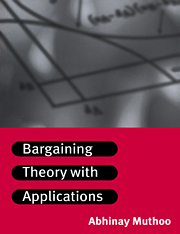5 - Outside Options
Published online by Cambridge University Press: 24 November 2009
Summary
Introduction
Consider a situation in which University A and academic economist B bargain over the wage. Moreover, suppose that the academic economist has been offered a job at some alternative (but similar) university at a fixed, non-negotiable, wage wB. A main objective of this chapter is to investigate the impact of such an ‘outside option’ on the outcome of bargaining between A and B. Although the academic economist B has to receive at least a wage of wB if she is to work at University A, it is far from clear, for example, whether the negotiated wage will equal wB, or strictly exceed wB. In the next section I study the role of outside options through a simple extension of the basic alternating-offers model studied in Section 3.2. Section 5.3 contains applications to relationship-specific investments, sovereign debt negotiations and bribery and the control of crime.
In contrast to the models studied in Chapter 4, in the model studied in Section 5.2 there is no exogenous risk of breakdown. A player's decision to take up her outside option (and thus, to terminate the negotiations in disagreement) is a strategic decision: no random event forces her to opt out. In Section 5.4 I extend the model studied in Section 5.2 by also allowing for a risk of breakdown — and thus I study the relative impacts on the bargaining outcome of the breakdown point and the outside option point.
- Type
- Chapter
- Information
- Bargaining Theory with Applications , pp. 99 - 136Publisher: Cambridge University PressPrint publication year: 1999
- 1
- Cited by



